YOUR PITCH SHOULD BE A HERO'S JOURNEY
YOUR PITCH SHOULD BE A HERO'S JOURNEY
YOUR PITCH SHOULD BE A HERO'S JOURNEY
How to use the world’s oldest and greatest storytelling template to sell your startup’s story
How to use the world’s oldest and greatest storytelling template to sell your startup’s story
How to use the world’s oldest and greatest storytelling template to sell your startup’s story
Adapted by Sunny Su for startup pitching for NC State University Entrepreneurship: Andrews Launch Accelerator
Source (by Jon Itkin): https://medium.com/article-group/the-only-first-call-deck-framework-you-need-a5093f9649a0
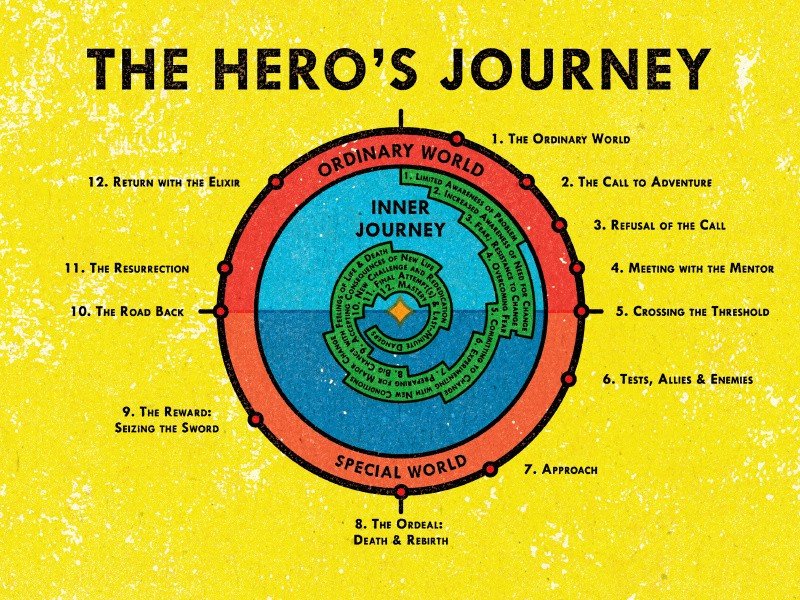





Art: Alexei Vella
STORYTELLING WILL ALWAYS BE CRUCIAL
STORYTELLING WILL ALWAYS BE CRUCIAL
STORYTELLING WILL ALWAYS BE CRUCIAL
Storytelling is the act of capturing an audience’s imagination. It’s the most precious skillset in pitching. That will never change — because it can’t.
Entrepreneurs must tell stories because our success depends entirely upon sparking the imagination of our stakeholders.
Those stakeholders must imagine themselves owning the product. Stories put words and images in their heads to help them do just that.
Storytelling is the act of capturing an audience’s imagination. It’s the most precious skillset in pitching. That will never change — because it can’t.
Entrepreneurs must tell stories because our success depends entirely upon sparking the imagination of our stakeholders.
Those stakeholders must imagine themselves owning the product. Stories put words and images in their heads to help them do just that.
The STORY-DRIVEN PITCH DECK IS A POWERFUL TOOL
The STORY-DRIVEN PITCH DECK IS A POWERFUL TOOL
The STORY-DRIVEN PITCH DECK IS A POWERFUL TOOL
Your pitch deck is one of your most powerful storytelling vehicles. It’s the tool that every person in the org uses when speaking to a prospect. It’s what helps you tell a consistent story at scale. Of course, there are many types of pitches. There are decks for investors and decks for customers. But here I’m talking about the deck that sells the strategic benefit of using your brand and and your product.
Any business leader will tell you: creating that kind of captivating story can be difficult.
This is especially true when you’re selling something technical to a sophisticated audience. This is where most entrepreneurs often fail. Why? Because they’re too close to their business. Because each feature feels special. And because they decline to realize the most effective shortcut of all—every story is the same.
Your pitch deck is one of your most powerful storytelling vehicles. It’s the tool that every person in the org uses when speaking to a prospect. It’s what helps you tell a consistent story at scale. Of course, there are many types of pitches. There are decks for investors and decks for customers. But here I’m talking about the deck that sells the strategic benefit of using your brand and and your product.
Any business leader will tell you: creating that kind of captivating story can be difficult.
This is especially true when you’re selling something technical to a sophisticated audience. This is where most entrepreneurs often fail. Why? Because they’re too close to their business. Because each feature feels special. And because they decline to realize the most effective shortcut of all—every story is the same.
EVERY STORY IS THE SAME
EVERY STORY IS THE SAME
EVERY STORY IS THE SAME
The details of those stories aren’t the same, no. But the template for those stories is.Here, the conversation about templates often turns to Y-Combinator Pitch Deck, or any number of deck templates. But those templates, too, are almost always variations on the oldest story template in the world.You probably learned about it in high school English class. It’s called the hero’s journey:
The details of those stories aren’t the same, no. But the template for those stories is.Here, the conversation about templates often turns to Y-Combinator Pitch Deck, or any number of deck templates. But those templates, too, are almost always variations on the oldest story template in the world.You probably learned about it in high school English class. It’s called the hero’s journey:
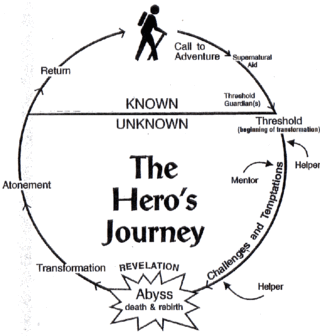
It’s a pretty simple cycle:
A hero, living in an ordinary world, hears a call to adventure
Meets a mentor
Receives a supernatural aid
Passes the threshold
Finds helpers
Endures hardships
Transforms into a stronger version of herself
Pays a price
And returns to their normal life, changed.
There are many variations of this journey, but they’re all basically the same. It’s such a ubiquitous template that it provides the structure for many of your favorite Netflix shows and movies—from The Wizard of Oz to Toy Story 3, from Mary Poppins to The Matrix.
Unique details, same storytelling stages.
It’s a pretty simple cycle:
A hero, living in an ordinary world, hears a call to adventure
Meets a mentor
Receives a supernatural aid
Passes the threshold
Finds helpers
Endures hardships
Transforms into a stronger version of herself
Pays a price
And returns to their normal life, changed.
There are many variations of this journey, but they’re all basically the same. It’s such a ubiquitous template that it provides the structure for many of your favorite Netflix shows and movies—from The Wizard of Oz to Toy Story 3, from Mary Poppins to The Matrix.
Unique details, same storytelling stages.
A PITCH DECK IS A HERO'S JOURNEY
A PITCH DECK IS A HERO'S JOURNEY
A PITCH DECK IS A HERO'S JOURNEY
There’s a reason screenwriters use this template!
A movie asks the audience to imagine themselves to be the protagonist in a fictional world.
To be the hero. To go on the journey. To win.
A pitch deck does the same thing. You’re asking your audience to imagine themselves as the hero.
That is, you are asking them to see a slightly different version of themselves — one that owns and uses your product, and is better for it.
One that goes on the journey. One who wins.
So when you construct your pitch deck, you’re simply telling the audience their journey as a hero.
You’re the mentor. The Gandalf. The Obi-Wan. The product and the brand.
There’s a reason screenwriters use this template!
A movie asks the audience to imagine themselves to be the protagonist in a fictional world.
To be the hero. To go on the journey. To win.
A pitch deck does the same thing. You’re asking your audience to imagine themselves as the hero.
That is, you are asking them to see a slightly different version of themselves — one that owns and uses your product, and is better for it.
One that goes on the journey. One who wins.
So when you construct your pitch deck, you’re simply telling the audience their journey as a hero.
You’re the mentor. The Gandalf. The Obi-Wan. The product and the brand.
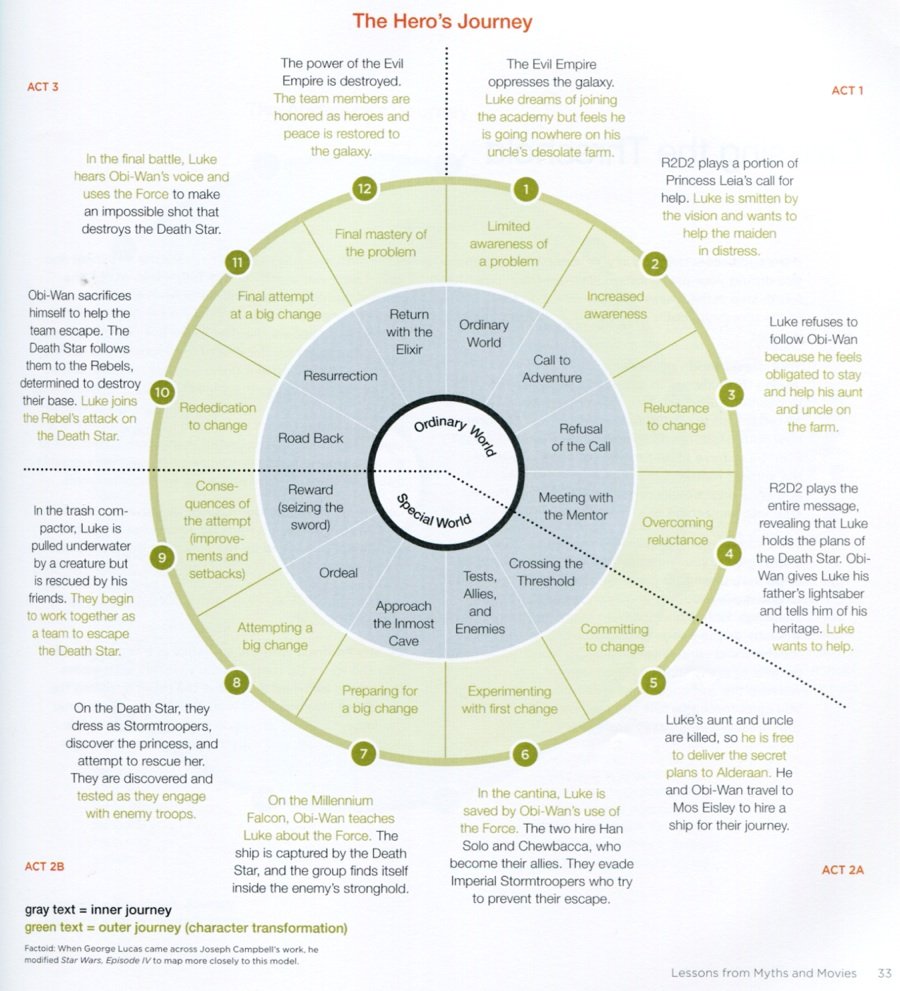





THE HERO'S JOURNEY ADAPTED FOR YOUR STARTUP PITCH
THE HERO'S JOURNEY ADAPTED FOR YOUR STARTUP PITCH
THE HERO'S JOURNEY ADAPTED FOR YOUR STARTUP PITCH
So! That said, here’s the template we’ve used with startup clients and global brands like MorningBrew, Nohbo, Neurun, CleanRays, NexReality, The Emmy Awards, Adidas, Jacuzzi, and many others to help their audience imagine themselves as winning the day.
Establish the context
The world is changing around your audience. Set that stage. Tell them what’s happening.Deliver an insight
This insight is a hint toward navigating the changing world. Thus, this insight should…Introduce a decision
Your audience can either remain unchanged (and thus be passed by the changing world), or they follow the path suggested by the insight. This is the beginning of their journey. Think Luke on Tatooine in Star Wars.Show what’s at stake
Show what’s likely to happen. Who wins and loses in this new world? Establish urgency, gravity, instrumentality. What happens if you don’t act?Introduce yourself (and your team)
Pretty self-explanatory. Say what you are, with clarity and concision.Show what you can do
Explain the benefits of your business, product, or service.Prove you can be trusted
Reveal your pedigree, history of success, etc.Show how to take action
Tell them what the next step, with you, is.
So! That said, here’s the template we’ve used with startup clients and global brands like MorningBrew, Nohbo, Neurun, CleanRays, NexReality, The Emmy Awards, Adidas, Jacuzzi, and many others to help their audience imagine themselves as winning the day.
Establish the context
The world is changing around your audience. Set that stage. Tell them what’s happening.Deliver an insight
This insight is a hint toward navigating the changing world. Thus, this insight should…Introduce a decision
Your audience can either remain unchanged (and thus be passed by the changing world), or they follow the path suggested by the insight. This is the beginning of their journey. Think Luke on Tatooine in Star Wars.Show what’s at stake
Show what’s likely to happen. Who wins and loses in this new world? Establish urgency, gravity, instrumentality. What happens if you don’t act?Introduce yourself (and your team)
Pretty self-explanatory. Say what you are, with clarity and concision.Show what you can do
Explain the benefits of your business, product, or service.Prove you can be trusted
Reveal your pedigree, history of success, etc.Show how to take action
Tell them what the next step, with you, is.
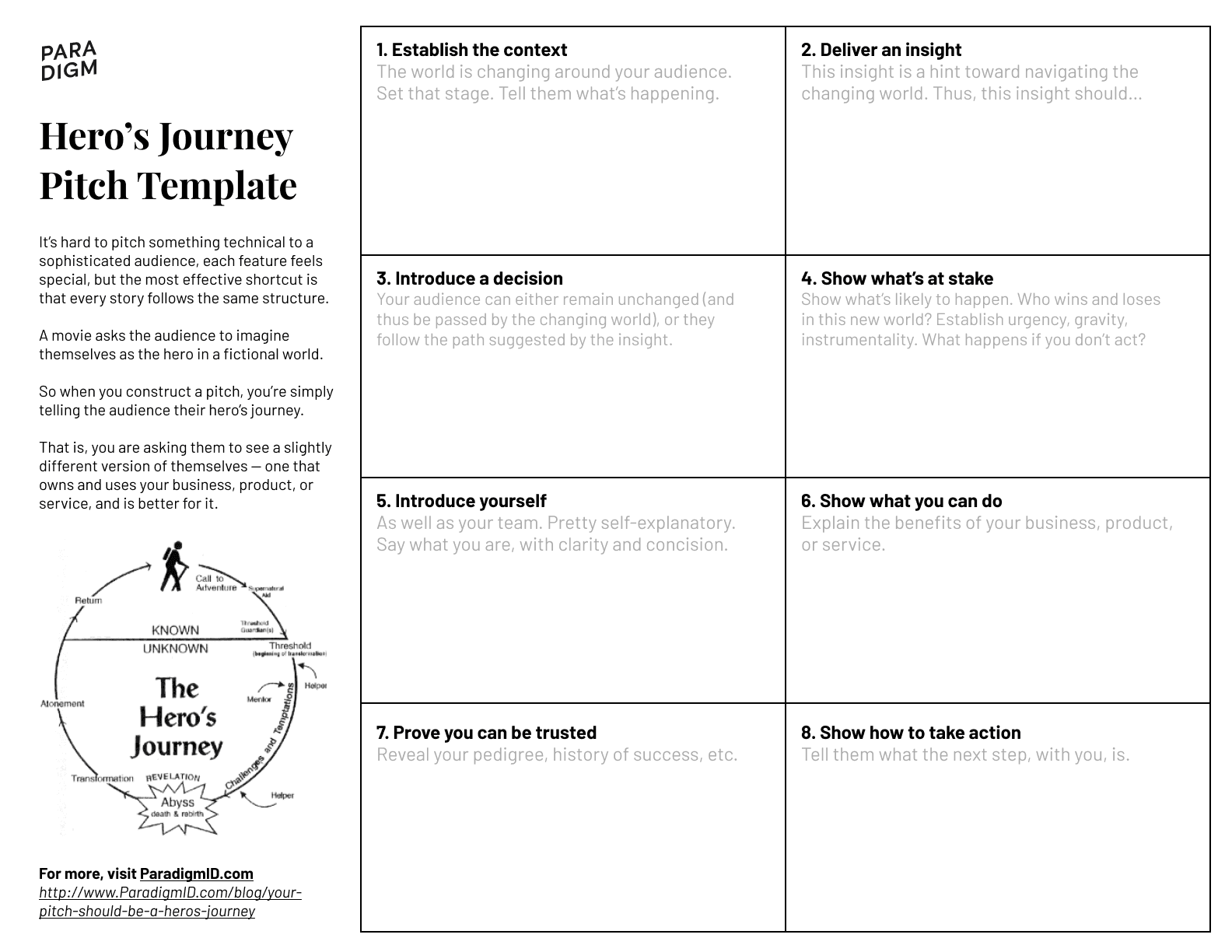





Print this out and try it for yourself!
Print this out and try it for yourself!
TRY INFUSING THIS STORYTELLING STRUCTURE INTO YOUR PITCH, AND LET ME KNOW HOW IT GOES
TRY INFUSING THIS STORYTELLING STRUCTURE INTO YOUR PITCH, AND LET ME KNOW HOW IT GOES
TRY INFUSING THIS STORYTELLING STRUCTURE INTO YOUR PITCH, AND LET ME KNOW HOW IT GOES
Questions? Disagreements? Amendments? Get in touch on this fine website, or over on Instagram at @solestio
Questions? Disagreements? Amendments? Get in touch on this fine website, or over on Instagram at @solestio
More post you may like
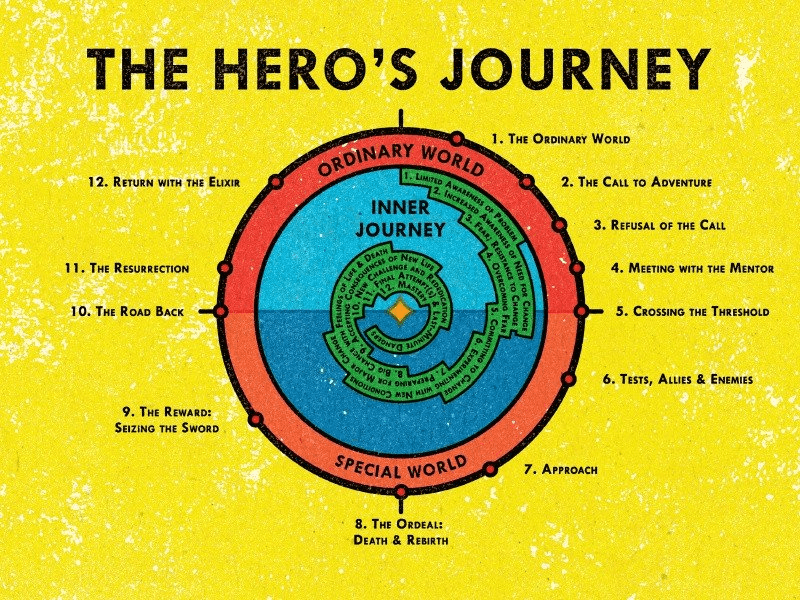
Your pitch should be a hero’s journey
Branding • Business Strategy
Continue learning

A plan is not a strategy
Business Growth • Business Strategy • Design Thinking • Strategy
Continue learning
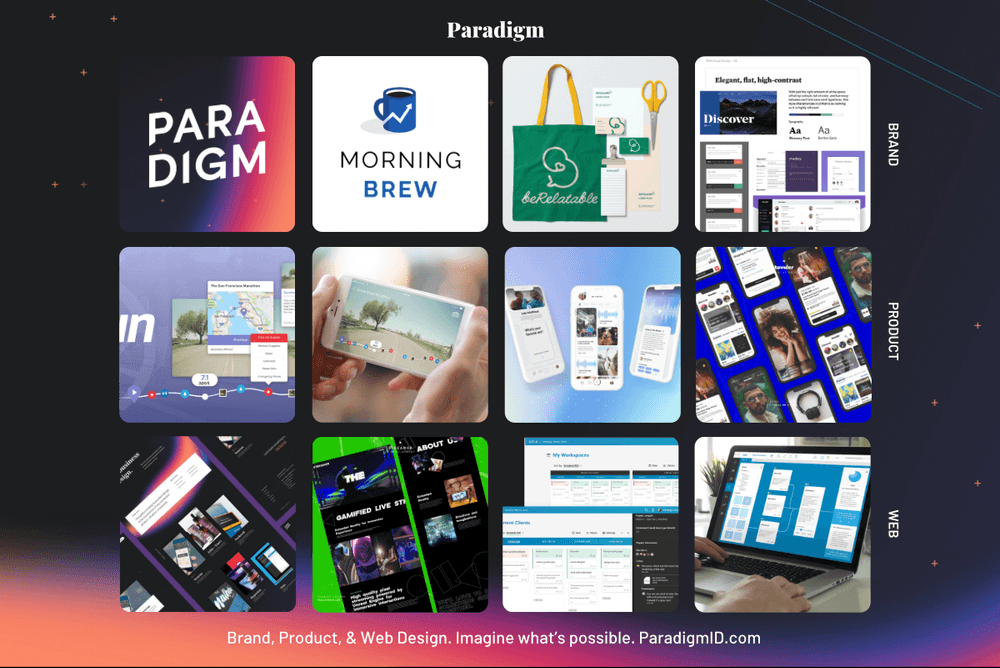
How early-stage SaaS startups can reduce the risk of failure with design
Business Growth • Business Strategy • Design
Continue learning

Building Brand Loyalty
Business Growth • Branding • Customer Experience • Design Thinking
Continue learning

Strategy is Execution!
Business Strategy • Business Growth • Product Development • Design Thinking • Product Market Fit• MVP Development
Continue learning

STAY FRESH, STAY RELEVANT!
Design Principles • Design Thinking • Business Growth • Branding
Continue learning

Communicating Brand Value with Visual Design
Design Principles • Business Growth
Continue learning
More post you may like

Your pitch should be a hero’s journey
Branding • Business Strategy
Continue learning

A plan is not a strategy
Business Growth • Business Strategy • Design Thinking • Strategy
Continue learning

How early-stage SaaS startups can reduce the risk of failure with design
Business Growth • Business Strategy • Design
Continue learning

Building Brand Loyalty
Business Growth • Branding • Customer Experience • Design Thinking
Continue learning

Strategy is Execution!
Business Strategy • Business Growth • Product Development • Design Thinking • Product Market Fit• MVP Development
Continue learning

STAY FRESH, STAY RELEVANT!
Design Principles • Design Thinking • Business Growth • Branding
Continue learning

Communicating Brand Value with Visual Design
Design Principles • Business Growth
Continue learning
More post you may like

Your pitch should be a hero’s journey
Branding • Business Strategy
Continue learning

A plan is not a strategy
Business Growth • Business Strategy • Design Thinking • Strategy
Continue learning

How early-stage SaaS startups can reduce the risk of failure with design
Business Growth • Business Strategy • Design
Continue learning

Building Brand Loyalty
Business Growth • Branding • Customer Experience • Design Thinking
Continue learning

Strategy is Execution!
Business Strategy • Business Growth • Product Development • Design Thinking • Product Market Fit• MVP Development
Continue learning

STAY FRESH, STAY RELEVANT!
Design Principles • Design Thinking • Business Growth • Branding
Continue learning

Communicating Brand Value with Visual Design
Design Principles • Business Growth
Continue learning
More post you may like

Your pitch should be a hero’s journey
Branding • Business Strategy
Continue learning

A plan is not a strategy
Business Growth • Business Strategy • Design Thinking • Strategy
Continue learning

How early-stage SaaS startups can reduce the risk of failure with design
Business Growth • Business Strategy • Design
Continue learning

Building Brand Loyalty
Business Growth • Branding • Customer Experience • Design Thinking
Continue learning

Strategy is Execution!
Business Strategy • Business Growth • Product Development • Design Thinking • Product Market Fit• MVP Development
Continue learning

STAY FRESH, STAY RELEVANT!
Design Principles • Design Thinking • Business Growth • Branding
Continue learning

Communicating Brand Value with Visual Design
Design Principles • Business Growth
Continue learning
More post you may like

Your pitch should be a hero’s journey
Branding • Business Strategy
Continue learning

A plan is not a strategy
Business Growth • Business Strategy • Design Thinking • Strategy
Continue learning

How early-stage SaaS startups can reduce the risk of failure with design
Business Growth • Business Strategy • Design
Continue learning

Building Brand Loyalty
Business Growth • Branding • Customer Experience • Design Thinking
Continue learning

Strategy is Execution!
Business Strategy • Business Growth • Product Development • Design Thinking • Product Market Fit• MVP Development
Continue learning

STAY FRESH, STAY RELEVANT!
Design Principles • Design Thinking • Business Growth • Branding
Continue learning

Communicating Brand Value with Visual Design
Design Principles • Business Growth
Continue learning
More post you may like

Your pitch should be a hero’s journey
Branding • Business Strategy
Continue learning

A plan is not a strategy
Business Growth • Business Strategy • Design Thinking • Strategy
Continue learning

How early-stage SaaS startups can reduce the risk of failure with design
Business Growth • Business Strategy • Design
Continue learning

Building Brand Loyalty
Business Growth • Branding • Customer Experience • Design Thinking
Continue learning

Strategy is Execution!
Business Strategy • Business Growth • Product Development • Design Thinking • Product Market Fit• MVP Development
Continue learning

STAY FRESH, STAY RELEVANT!
Design Principles • Design Thinking • Business Growth • Branding
Continue learning

Communicating Brand Value with Visual Design
Design Principles • Business Growth
Continue learning
Let's Talk
All rights reserved 2025
Let's Talk
All rights reserved 2025
Let's Talk
All rights reserved 2025
Let's Talk
All rights reserved 2025
Let's Talk
All rights reserved 2025
Let's Talk
All rights reserved 2025
Let's Talk
All rights reserved 2025

